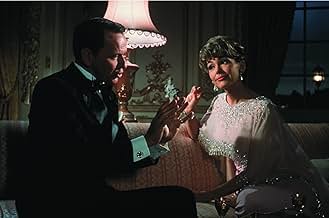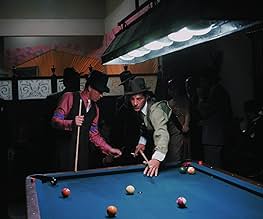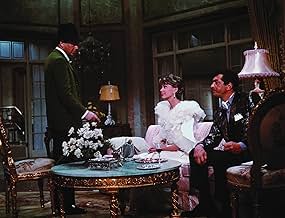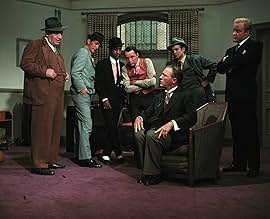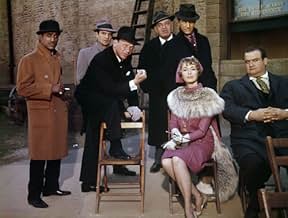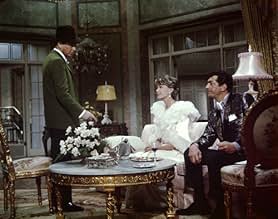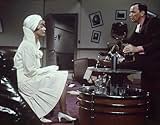In Prohibition-era Chicago, two rival gangs compete for control of the city's rackets.In Prohibition-era Chicago, two rival gangs compete for control of the city's rackets.In Prohibition-era Chicago, two rival gangs compete for control of the city's rackets.
- Nominated for 2 Oscars
- 6 nominations total
Jack La Rue
- Tomatoes
- (as Jack LaRue)
- Director
- Writer
- All cast & crew
- Production, box office & more at IMDbPro
Featured reviews
Of all the five films they did together, the legendary Rat Pack never had a better cinematic vehicle for their talents than right here! You get the feeling, right from the start, that Frankie, Dino, Sammy, Bing, and Peter Falk weren't really acting. They were cutting loose, having a ball, and loving every minute of it. And you will, too! Not only are there the great Cahn - Van Heusen songs, including the Oscar-nominated "My Kind of Town," but there's the legendary William Daniels' excellent color photography, and Don Feld's period costumes. And, in addition to the aforementioned Rats, the performances of Barbara Rush as Marian (The script implies that her maidenly status was long since spoken for!), the underrated Robert Foulk as the corrupt Sheriff Glick, the always-funny Victor Buono as his even more nefarious Deputy, Alvin Potts, and the always funny veterans Hank Henry, Richard Bakalyan, and Phil Arnold as various lovable lowlifes.
A couple of sad footnotes connected with this film, though: The funeral scene for Edward G. Robinson's character was filmed in an actual cemetery. While there, Sinatra, whose tumultuous relations with the Kennedys were well known, came across an actual gravestone for a "John F. Kennedy, 1800 - 1878." They joked about it the rest of the day, and drew a lot of disapproving looks, until someone turned on a car radio on the afternoon of November 22, 1963! Another scene, which was never used in the finished film, was a kidnapping scene, filmed the same day as Frank Jr. was kidnapped. For a film to be entertaining and funny under these circumstances is nothing short of amazing, but "Robin and the Seven Hoods" manages to be, in the last of the Rat Pack films, and the best one of all of them!
A couple of sad footnotes connected with this film, though: The funeral scene for Edward G. Robinson's character was filmed in an actual cemetery. While there, Sinatra, whose tumultuous relations with the Kennedys were well known, came across an actual gravestone for a "John F. Kennedy, 1800 - 1878." They joked about it the rest of the day, and drew a lot of disapproving looks, until someone turned on a car radio on the afternoon of November 22, 1963! Another scene, which was never used in the finished film, was a kidnapping scene, filmed the same day as Frank Jr. was kidnapped. For a film to be entertaining and funny under these circumstances is nothing short of amazing, but "Robin and the Seven Hoods" manages to be, in the last of the Rat Pack films, and the best one of all of them!
After an emotional rendition of 'For He's a Jolly Good Fellow' number one gangster, Big Jim, is shot dead at his own birthday party, and Guy Gisborne (Peter Falk) takes over the mob
Robbo (Frank Sinatra), a rival gangster, warns Gisborne to stay out of the North Side John (Dean Martin), a minor hood from Indiana, joins Robbo's gang just before Robbo and Gisborne destroy each other's nightclubs Robbo rebuilds, outfitting his new gambling hall so that it becomes a new little modern casino at the touch of a button
Marian (Barbara Rush), Big Jim's daughter, gives Robbo $50 grand to kill her father's murderers, but he orders Will (Sammy Davis, Jr.), his aide, to donate the money to an orphanage Allan A. Dale (Bing Crosby), who runs the institution, crowns Robbo as a modern-day Robin Hood
The action takes place in the gangland Chicago of 1928 instead of Sherwood Forest Amusing ideas abounded The best being a brief appearance by Edward G. Robinson as the chief hood who is shot by the mob just few seconds in the film
Don't miss the formidable dance number "Style" performed and sung by Sinatra, Martin, and Crosby
Robbo (Frank Sinatra), a rival gangster, warns Gisborne to stay out of the North Side John (Dean Martin), a minor hood from Indiana, joins Robbo's gang just before Robbo and Gisborne destroy each other's nightclubs Robbo rebuilds, outfitting his new gambling hall so that it becomes a new little modern casino at the touch of a button
Marian (Barbara Rush), Big Jim's daughter, gives Robbo $50 grand to kill her father's murderers, but he orders Will (Sammy Davis, Jr.), his aide, to donate the money to an orphanage Allan A. Dale (Bing Crosby), who runs the institution, crowns Robbo as a modern-day Robin Hood
The action takes place in the gangland Chicago of 1928 instead of Sherwood Forest Amusing ideas abounded The best being a brief appearance by Edward G. Robinson as the chief hood who is shot by the mob just few seconds in the film
Don't miss the formidable dance number "Style" performed and sung by Sinatra, Martin, and Crosby
I consider this the best of all the Clan movies that Frank Sinatra did with his pallies. By the time Robin and the 7 Hoods was made, Sinatra's movie career consisted of a lot of sleep walking roles. But Frank still took his singing quite seriously and he's at the top of his game in this one.
Since he produced and starred in it naturally Frankie reserved for himself the best song in the Jimmy Van Heusen-Sammy Cahn score. My Kind of Town did for Chicago what New York, New York did for the Big Apple and was nominated for best song that year. Sinatra delivers it in grand style.
He gave a little something for everyone in the cast. Peter Falk who plays Guy Gisborne gets one of those once in a lifetime chances to overact with abandon and gusto. He looks like he's having a ball, especially singing All For One And One For All as he's electing himself numero uno of the Chicago gangs.
Sammy Davis, Jr. other than in Porgy and Bess and here got very little opportunity to show off his amazing multi-talents in film. His Bang Bang number as Frankie's crew is busting up Falk's speakeasy, displays those talents of singing, dancing and mimicry. Listen close and you'll Davis do some good imitations of Al Jolson and Jerry Lewis.
Bing Crosby in his last musical role plays Alan-A-Dale and he replaced Peter Lawford when he and Sinatra came to an abrupt parting of the ways. He's the secretary of an orphans home where Sinatra donates some hot money to launder it. Crosby's one solo number in this is Don't Be A Do-Badder which is vintage philosophical Bing and I'm sure Van Heusen and Cahn wrote it after the casting change was made.
Dean Martin got short changed here. I wish he'd been given something better as a solo than Any Man Who Loves His Mother.
There's a song on the cast album that is heard in the background called I Like To Lead When I Dance. It got cut from the film. It also appeared on other Sinatra albums and Old Blue Eyes does really well by it. I wish it had been left in.
You can't possibly go wrong with all the talent that Sinatra gathered for this film. It was his last musical role as well.
Since he produced and starred in it naturally Frankie reserved for himself the best song in the Jimmy Van Heusen-Sammy Cahn score. My Kind of Town did for Chicago what New York, New York did for the Big Apple and was nominated for best song that year. Sinatra delivers it in grand style.
He gave a little something for everyone in the cast. Peter Falk who plays Guy Gisborne gets one of those once in a lifetime chances to overact with abandon and gusto. He looks like he's having a ball, especially singing All For One And One For All as he's electing himself numero uno of the Chicago gangs.
Sammy Davis, Jr. other than in Porgy and Bess and here got very little opportunity to show off his amazing multi-talents in film. His Bang Bang number as Frankie's crew is busting up Falk's speakeasy, displays those talents of singing, dancing and mimicry. Listen close and you'll Davis do some good imitations of Al Jolson and Jerry Lewis.
Bing Crosby in his last musical role plays Alan-A-Dale and he replaced Peter Lawford when he and Sinatra came to an abrupt parting of the ways. He's the secretary of an orphans home where Sinatra donates some hot money to launder it. Crosby's one solo number in this is Don't Be A Do-Badder which is vintage philosophical Bing and I'm sure Van Heusen and Cahn wrote it after the casting change was made.
Dean Martin got short changed here. I wish he'd been given something better as a solo than Any Man Who Loves His Mother.
There's a song on the cast album that is heard in the background called I Like To Lead When I Dance. It got cut from the film. It also appeared on other Sinatra albums and Old Blue Eyes does really well by it. I wish it had been left in.
You can't possibly go wrong with all the talent that Sinatra gathered for this film. It was his last musical role as well.
Take the Rat Pack (an expression Sinatra hated, by the way), add some great songs, a decent story, AND Bing Crosby, and what do you get?
Well, less than you might expect-I've rated this a "7", because despite the above, Sinatra much of the time looks like he'd rather be someplace else, and Peter Falk's performance is cliche'-ridden.
The reason to see this one is Bing Crosby. He has several great songs, delivered in his inimitable style, such as "Mr. Booze". And his comedy bits, especially as a preacher to a Salvation Army-like meeting, are hilarious.
Well, less than you might expect-I've rated this a "7", because despite the above, Sinatra much of the time looks like he'd rather be someplace else, and Peter Falk's performance is cliche'-ridden.
The reason to see this one is Bing Crosby. He has several great songs, delivered in his inimitable style, such as "Mr. Booze". And his comedy bits, especially as a preacher to a Salvation Army-like meeting, are hilarious.
I was expecting less, as I once saw this referred to somewhere as a "self-indulgent" effort from The Chairman of the Board. I found it, au contraire, to be a solidly entertaining, well-made comedic effort with high production values, beautifully shot (the film really needs letterbox to show it off; catch it on American Movie Classics). Good work from all the leads, Peter Falk in particular, as well as the many familiar charcter actors. It is interesting how Frank's outfit never seems to quite fit into the 1928 setting - he always seems ready to step off the screen into 1964 Las Vegas. The nostagically vaudevillian number "Style", sung by Frank, Dean, and Bing, is worth the whole movie. Well worth a see.
Did you know
- TriviaOn the same day as the funeral scene was filmed, President John F. Kennedy (a personal friend of Frank Sinatra's) was assassinated.
- GoofsWhen the cornerstone for the police station is being dedicated, and again when the pretzel factory cornerstone is being dedicated, mountains can be seen over the rooftops of the buildings in the background. There are no mountains in Chicago.
- Quotes
Little John: When your opponent's sittin' there holding all aces, there's only one thing left to do: Kick over the table.
- ConnectionsFeatured in It's Black Entertainment (2002)
- SoundtracksMy Kind of Town
(uncredited)
Lyrics by Sammy Cahn
Music by Jimmy Van Heusen (as James Van Heusen)
Performed by Frank Sinatra
- How long is Robin and the 7 Hoods?Powered by Alexa
Details
- Release date
- Country of origin
- Language
- Also known as
- Robin Hood de Chicago
- Filming locations
- Rosedale Cemetary, Los Angeles, California, USA(cemetary scenes - now Angelus-Rosedale)
- Production companies
- See more company credits at IMDbPro
Box office
- Gross US & Canada
- $9,810,000
- Runtime
- 2h 3m(123 min)
- Aspect ratio
- 2.35 : 1
Contribute to this page
Suggest an edit or add missing content


